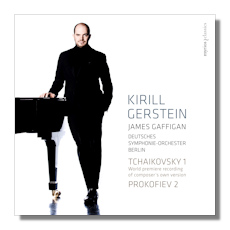
The Internet's Premier Classical Music Source
Related Links
-
Prokofieff Reviews
Tchaikovsky Reviews - Latest Reviews
- More Reviews
-
By Composer
-
Collections
DVD & Blu-ray
Books
Concert Reviews
Articles/Interviews
Software
Audio
Search Amazon
Recommended Links
Site News
 SACD Review
SACD Review
"The Real Tchaikovsky"

- Piotr Ilyitch Tchaikovsky: Piano Concerto #1 in B Flat minor, Op. 23 (CW53)
- Serge Prokofieff: Piano Concerto #2 in G minor, Op. 16
Kirill Gerstein, piano
Deutsches Symphonie-Orchester Berlin/James Gaffigan
Myrios Classics SACD MYR016 65:25 Hybrid Multichannel
The main point of interest regarding this disc is its offering of the recording premiere of the Tchaikovsky First Piano Concerto in its so-called "composer's version". There are three versions of the work: the original (1875), the revised edition (1879) favored by Tchaikovsky when he conducted the piece, and the posthumous rendition (published after 1894), which was apparently fashioned by Alexander Siloti and/or other editors. This last of the three versions is the popular one that listeners across the globe are familiar with. Siloti, Rachmaninov's cousin, was a skilled pianist and conductor, but a composer of minor significance. He met with Tchaikovsky shortly before his death and claimed the composer sanctioned some changes in the work. Whether Tchaikovsky actually agreed to a few changes or a large number of them or none at all cannot be known, but it would seem doubtful that he would entrust revisions to one of his most popular scores to the burgeoning talent Siloti, who would have been around twenty-nine years of age at the time of the meeting. One might also doubt that other "editors" would have been assigned the task. Why wouldn't Tchaikovsky have left some written confirmation of the revisions or made them himself? Thus, one is left with the view that the posthumous version could be valid but more likely contains mostly or perhaps completely spurious revisions.
The 1879 "composer's version" offered on this Myrios disc differs in four major respects from the posthumous rendition: the chords played by the piano during the big theme in the concerto's opening are arpeggiated on every second and third beat with the right hand chords played an octave lower; the second movement middle section is played allegro vivace instead of the possibly spurious prestissimo; a cut in the finale (from about 2:27 to 2:56 on track three of this disc) is restored; and the finale's big octave cadenza features no leaps near the end. This last difference is not mentioned in the album notes but is very noticeable in the performance here. The notes mention that there are other changes in the concerto relating to "dynamics, articulation and tempo indications." While these last, comparatively minor changes are sprinkled throughout the concerto, they are less noticeable and harder to identify without a close comparison of the two scores. At any rate, apart from the major changes mentioned above, most listeners will notice little else that is significantly different here from the standard, posthumous version.
True, there are some slightly unusual tempos taken in this performance that one suspects relate to the changes: for example, the lively rather bouncy main theme in the first movement, supposedly based on a Ukrainian folk melody, is taken much slower than usual here. But Gerstein makes the tempo work in the overall context of his interpretation, and goes on to deliver a solid, well imagined account of this Tchaikovsky concerto, generally eschewing bravura and showing the work as a bold, highly imaginative and lushly Romantic composition. He applies wide-ranging dynamics with great sensitivity, plays with almost scrupulous attention to detail, and effectively captures Tchaikovsky's heart-on-sleeve emotions and grand sense for drama.
This is a well-conceived and executed Tchaikovsky First then, not least because James Gaffigan draws splendid and accurate playing from the excellent Deutsches Symphonie Orchester Berlin. There are many fine recordings of the posthumous version of the Tchaikovsky, including the Cliburn, Argerich (with Dutoit, with Kondrashin and on video with Groves), Richter and others, but this is a one-of-a-kind recording by Gerstein that Tchaikovsky and piano mavens are urged to acquire. Even if there were other recordings of the "composer's version", I suspect Gerstein would rank among the best of them.
By the way, the Deutsches Symphonie Orchester Berlin appeared on a Naïve CD of the Prokofiev Second with pianist Anna Vinnitskaya, which I reviewed here (Na´ve V5238) in 2010 and praised to the high heavens as the best of many versions. Gerstein is good on his own more measured terms in the Prokofiev, pointing up some interesting and often hidden detail, especially in the bass regions: try his first statement of the big theme in the finale and notice how he plays up the deliciously sour harmonies in the left hand. His first movement cadenza is also interesting for its clarity and epic sense. Overall, he produces a good, quite muscular version of this increasingly popular concerto that will appeal to many listeners even if it doesn't unseat Vinnitskaya. The sound reproduction in both works is powerful and clear. The album notes are very insightful and of great importance in understanding the various versions of the Tchaikovsky First Piano Concerto. Highly recommended.
Copyright © 2015, Robert Cummings





















